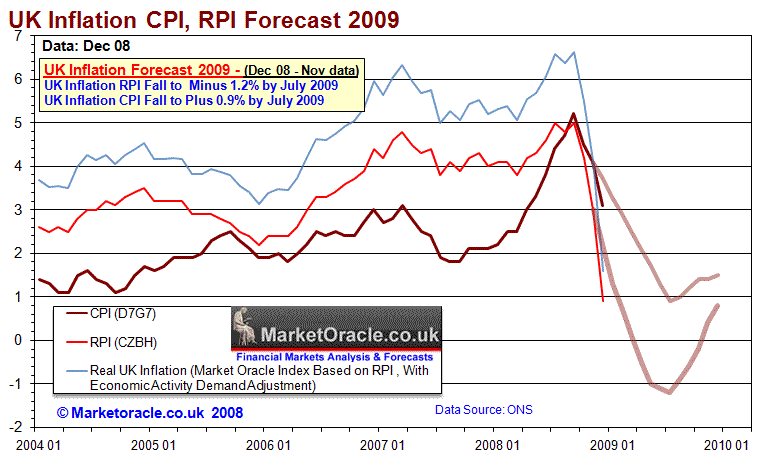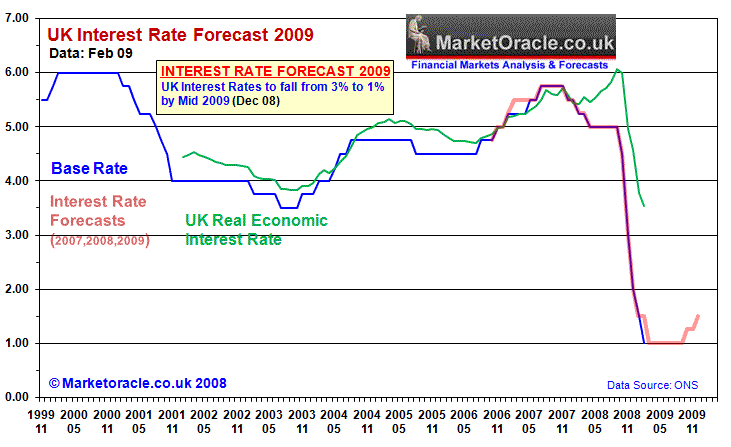UK Economic Meltdown Continues Towards Price Deflation
Economics / Recession 2008 - 2010 Feb 11, 2009 - 10:26 PM GMTBy: Nadeem_Walayat

 The Bank of England's quarterly inflation report forecast UK inflation of just 0.5% in 2 years time, with the UK economy now forecast to have fallen by GDP 4% by the middle of this year. It was not so many months ago that the Bank of England was forecasting growth of 2% for 2009.
The Bank of England's quarterly inflation report forecast UK inflation of just 0.5% in 2 years time, with the UK economy now forecast to have fallen by GDP 4% by the middle of this year. It was not so many months ago that the Bank of England was forecasting growth of 2% for 2009.
Bank Governor Mervyn King implied by his accompanying statement that he does not have a clue what he is doing, as the UK economy under his and Gordon Browns collective stewardship continues to fall off the edge of a cliff, the Bank of England Governor stated :
“The United Kingdom economy is in deep recession. The length and depth of the recession will depend to a significant extent on developments in the rest of the world, where a severe economic downturn has taken hold.”
- The economy faces its deepest recession since the post-war years of 1945 and 1946, and its worst peacetime decline since 1931.
- The Bank is likely to reduce interest rates further, perhaps to as low as zero, in an attempt to prevent the downturn becoming worse than the depression in the 1930s.
It will resort to new drastic measures to pump extra cash into the economy as soon as this week. - Unemployment – which hit 1.97 million yesterday – will rise further and house prices will continue to fall in the coming months.
My commentary during the summer months of 2008 seems to have been proved accurate in that the BoE MPC at those monthly meetings remained paralysed by the fear of inflation and more or less sat sipping tea and conversing about the weather whilst the economy continued to burn towards the fourth quarter crash.
What is the Governments Solution ?
Quantative Easing aka Printing Money - The consequences of which are that Britain is at increased risk of bankruptcy as I first warned off in April 2008 following the first print run of £50 billion by the Bank of England and reiterated on a near monthly basis since (archive), with the most recent article ( UK Interest Rates Crash to 1% New Record Low) updating to the current position of Britain's path towards bankruptcy.
The British Pound responded to the Bank of England's report by resuming its bear market after the correctly forecast bounce from £/$1.37 to above £/$ 1.45 and now again on route towards parity to the U.S. Dollar. (21st Jan 09 - British Pound Panic Selling, Counting Down to Bankrupt Britain )
FSA - Who Should Regulate the Regulator?
To illustrate the point in how wide the gap is between competent regulation of the UK banking system and how it is actually being regulated by the FSA, not just before the credit crisis broke in August 2007, nor in the immediate aftermath which witnessed the run on Northern Rock Bank, but to this very day some 18 months on as witnessed by the resignation of Sir James Crosby, Gordon Browns own appointment as the Deputy Chairman of the FSA on allegations that during his tenure as the head of HBOS (Halifax), he sacked Paul Moore due to the alleged complaints he had made about the banks risk taking that had not been properly minuted at HBOS board meetings.
Deflation of 2009 Will Eventually Turn to Inflation
My earlier analysis of the UK inflation concluded that the UK is heading for real deflation during 2009, with the RPI inflation measure expected to go negative by mid 2009 by targeting -1.2% . The expectations are for similar deflation across the world, as deficit spending stimulus packages cannot hope to compete against the loss of asset values which are in the order of ten times the amount of planned stimulus. The analysis also concluded in that the immediate risks to the forecast are to the downside i.e. prices spiking lower than expected.

This therefore implies for further stimulus packages far beyond that which have been committed to date, with all of the associated consequences of collapsing currencies under the weight of growing deficits and liabilities which sets the scene for higher future inflation as the deflationary impact of collapse in crude oil during the second half of 2008 starts to leave the inflation indices during the second half of 2009, thereafter the deflationary forces of contracting economies will compete with the inflationary forces of money printing and rising commodity prices.
For more on the impact of deflation, download the world's foremost expert on and proponent of the deflationary scenario,Robert Prechter's FREE 60-page Deflation Survival eBook or browse various deflation topics like those below :
- What happens during deflation?
- Why is deflation bad?
- Effects of deflation
- Deflationary spiral
- And much more in Prechter's FREE Deflation Survival Guide.
UK Interest Rate Forecast 2009
The February rate cut to 1% fulfills the forecast target for 2009 (4th Dec 08 - UK Interest Rates Forecast to Crash to 1% ). ,The next stop would be a similar Zero Interest Rate Policy (ZIRP) as that adopted by the United States that have cut their interest rate to 0.25%.

Whilst the base interest rate stands at 1%, the 3 month libor rate is at 2.14% and the real economic interest rate is at 3.54%, which clearly indicate evidence that the banks are still refusing to the lend and in-effect hoarding government bailout cash injections much of which is being used to reward bonuses to culpable staff.
Deflation Investing Strategy
Now again I need to emphasis that during economic contraction most asset prices will fall i.e. stocks and housing, other assets such as industrial commodities such as crude oil and base metals will formulate a saucer shaped bottoming pattern. Others will lead future inflation higher i.e. agricultural commodities, and then we have the alternatives to deflation AND inflation as embodied by gold and gold stocks that follow a more volatile pattern based on investor fear (See Jan 09 - Financial Markets Forecasts for 2009 )
MY strategy as I have iterated over the past 4 months is basically to drip accumulate assets at rock bottom prices during the current deflationary crash of 2009. That means rock solid dividend paying stocks, commodities (especially oil and agricultural) and inflation linked bonds. Deflation is temporary and WILL give way to much higher inflation. (Oct 2008 - Stocks Bear Market Long-term Investing Strategy )
The indepth forecast for the UK recession in terms of GDP contraction is underway, to receive this in your email in box on the date of publication subscribe to my always free email newsletter.
By Nadeem Walayat
http://www.marketoracle.co.uk
Copyright © 2005-09 Marketoracle.co.uk (Market Oracle Ltd). All rights reserved.
Nadeem Walayat has over 20 years experience of trading derivatives, portfolio management and analysing the financial markets, including one of few who both anticipated and Beat the 1987 Crash. Nadeem's forward looking analysis specialises on the housing market and interest rates. Nadeem is the Editor of The Market Oracle, a FREE Daily Financial Markets Analysis & Forecasting online publication. We present in-depth analysis from over 250 experienced analysts on a range of views of the probable direction of the financial markets. Thus enabling our readers to arrive at an informed opinion on future market direction. http://www.marketoracle.co.uk
Disclaimer: The above is a matter of opinion provided for general information purposes only and is not intended as investment advice. Information and analysis above are derived from sources and utilising methods believed to be reliable, but we cannot accept responsibility for any trading losses you may incur as a result of this analysis. Individuals should consult with their personal financial advisors before engaging in any trading activities.
Attention Editors and Publishers! - You have permission to republish THIS article. Republished articles must include attribution to the author and links back to the http://www.marketoracle.co.uk . Please send an email to republish@marketoracle.co.uk, to include a link to the published article.
Nadeem Walayat Archive |
© 2005-2022 http://www.MarketOracle.co.uk - The Market Oracle is a FREE Daily Financial Markets Analysis & Forecasting online publication.


